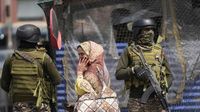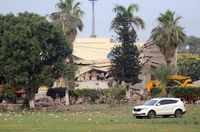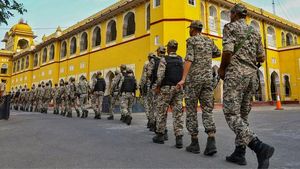Tensions between India and Pakistan escalated dramatically on May 7, 2025, following a series of missile strikes by the Indian military against what it termed "terrorist" targets in Pakistan. This operation, named "Operation Sindoor," was in direct response to a terrorist attack in Indian-administered Kashmir on April 22 that resulted in the deaths of 26 tourists, an incident that New Delhi blamed on Pakistan-based militants.
In the retaliatory strikes, the Indian army targeted at least nine locations across the Pakistani provinces of Punjab and Kashmir, leading to significant casualties. According to reports from the Pakistani army, at least 31 civilians, including two three-year-old girls, were killed, and 46 others were injured in the attacks that struck six different sites. The deadliest incident occurred in Bahawalpur, where a missile hit a mosque, resulting in multiple fatalities.
Pakistani officials condemned the Indian strikes, with military spokesman Lieutenant General Ahmed Chaudhry labeling the attacks as a "flagrant act of war" and vowing a strong response. "We will respond at the time, in the place, and in the ways that we choose," he asserted. The Pakistani army also claimed to have shot down five Indian fighter jets during the exchanges that followed the missile strikes, although Indian sources reported that three aircraft were lost.
In the aftermath of the attacks, both nations experienced a surge in military activity along the Line of Control, the de facto border in the Kashmir region. Reports indicated that Pakistani artillery fired into Indian territory, resulting in additional civilian casualties, with at least three Indians reportedly killed by return fire.
As tensions mounted, international reactions poured in. U.S. Secretary of State Marco Rubio urged both nations to engage in dialogue to de-escalate the crisis. He emphasized the need for open communication channels to prevent further military confrontation. "The world cannot afford a military clash between India and Pakistan," Rubio stated, reflecting the concerns of many global leaders.
United Nations spokesperson Antonio Guterres echoed these sentiments, expressing grave concern over the military operations and urging both sides to exercise restraint. The UN emphasized that continued hostilities could have dire consequences not only for the region but for global stability.
In a show of solidarity, the Iranian Foreign Minister Abbas Araghchi was scheduled to visit New Delhi on the same day, having just concluded talks in Islamabad. Iran's involvement highlights the complex geopolitical dynamics at play, as various nations seek to mediate the escalating conflict.
Meanwhile, the situation has led to significant disruptions in air travel, with over 20 commercial flights rerouted to avoid Pakistani airspace, and 52 flights canceled due to the heightened military tensions. Airlines are adjusting their routes, with some flights from India to Europe taking longer detours to bypass the region.
The Indian government has justified the missile strikes as a necessary measure to dismantle terrorist infrastructure, claiming that the targeted sites were involved in planning further attacks against India. Indian Interior Minister Amit Shah expressed pride in the armed forces, stating, "The operation is a response to the brutal murder of our innocent brothers in Pahalgam. The Modi government is determined to respond appropriately to any attack on India and its people. We remain committed to eradicating terrorism at its roots."
In contrast, the Pakistani government has condemned the strikes as cowardly acts against innocent civilians. Information Minister Attaullah Tarar criticized India for targeting civilian structures, including places of worship, and promised a decisive response from the Pakistani military.
As the conflict unfolds, the international community remains on high alert. The escalating violence marks one of the most severe military confrontations between the two nuclear-armed neighbors in recent years, raising fears of a broader conflict.
Historically, the Kashmir region has been a flashpoint for India and Pakistan since the partition of British India in 1947, leading to multiple wars and ongoing skirmishes. The current situation is further complicated by Pakistan's long-standing allegations of Indian support for insurgents within its borders, while India accuses Pakistan of harboring terrorists.
With both nations now mobilizing their military forces, the potential for further violence looms large. Analysts warn that without immediate diplomatic intervention, the situation could spiral out of control, with catastrophic consequences for the millions living in the region.
As the world watches closely, the need for dialogue and restraint has never been more critical. The stakes are high, and the consequences of inaction could reverberate far beyond the borders of India and Pakistan.







